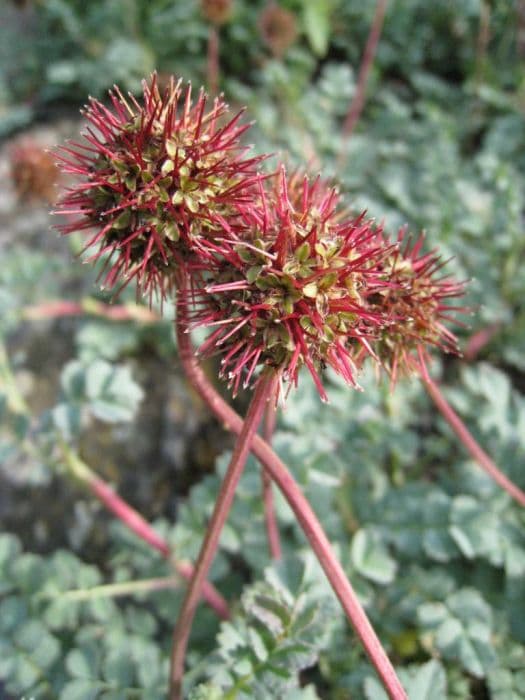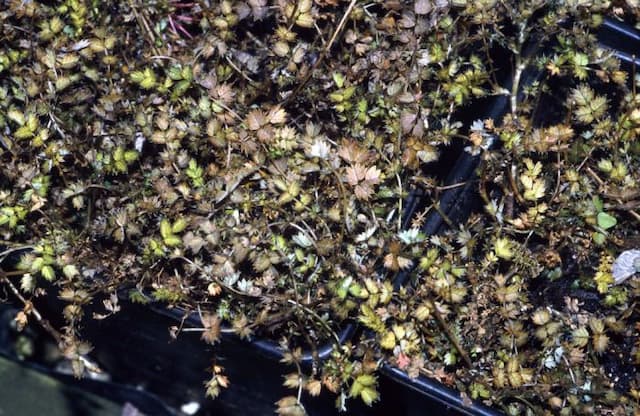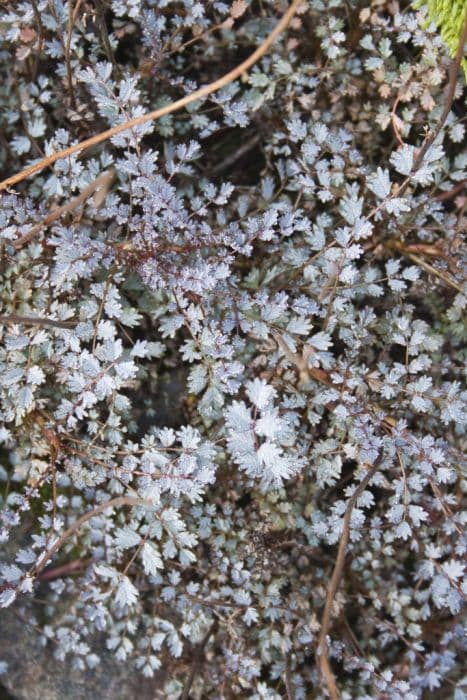Golden Delicious Apple Malus domestica 'Golden Delicious' (D)

ABOUT
The 'Golden Delicious' apple tree is known for producing fruit that is large and skin that is a warm, golden shade, often with a pink to reddish blush. It blossoms with white flowers that are delicate and slightly fragrant. The leaves of this tree are green, ovate and come to a subtle point and have a serrated margin. The appearance of the apple itself is rounded and may sometimes be slightly elongated. The skin of the fruit is smooth with numerous small lenticels, which appear as spots. The tree's branches tend to spread and will hold the fruits, typically ripening by late summer to early fall, ready to be picked when they achieve their namesake golden color and a sweet, mellow flavor.
About this plant
 Names
NamesFamily
Rosaceae
Synonyms
Golden Delicious Apple
Common names
Pyrus malus var. domestica, Malus communis, Malus pumila, Malus sylvestris var. domestica, Malus sativa.
 Toxicity
ToxicityTo humans
Golden Delicious apple trees are not toxic to humans. The fruit is edible and widely consumed. However, the seeds inside the apples contain amygdalin, which can release cyanide when digested. Swallowing whole seeds in small amounts is unlikely to cause harm because the seeds have a hard coating that resists digestion. But if the seeds are chewed and consumed in very large quantities, they could release enough cyanide to cause symptoms of poisoning, which can include headache, dizziness, confusion, vomiting, and potentially more severe symptoms such as respiratory failure and even death in extreme cases. However, such instances are extremely rare, and the apple fruit itself is safe and nutritious to eat.
To pets
Golden Delicious apple trees are also not toxic to pets. The fruit can be safely given to pets like dogs in moderation, taking care to remove the seeds before offering the fruit. Similar to humans, the apple seeds contain small amounts of amygdalin, which is a cyanogenic glycoside. When the seeds are chewed or broken, they can release cyanide when metabolized. Ingestion of large quantities of chewed seeds could potentially cause cyanide toxicity in pets, with symptoms including difficulty breathing, bright red gums, and potential shock or coma. It is very rare for pets to ingest a sufficient quantity of apple seeds to cause serious harm. Offering pets the flesh of the apple without the seeds is generally safe.
 Characteristics
CharacteristicsLife cycle
Perennials
Foliage type
Deciduous
Color of leaves
Green
Flower color
White
Height
12-15 feet (3.7-4.6 meters)
Spread
12-15 feet (3.7-4.6 meters)
Plant type
Tree
Hardiness zones
5-8
Native area
Asia
Benefits
 General Benefits
General Benefits- Nutritional Value: Apples are a rich source of vitamins (A, C, and several B-complex vitamins) and dietary fiber which are important for maintaining good health.
- Fresh Fruit Supply: The 'Golden Delicious' apple provides fresh, sweet-tasting fruit that can be eaten raw, cooked, or used in various culinary dishes.
- Economic Value: Apple farming, particularly of popular varieties like the 'Golden Delicious', can be economically rewarding for farmers due to high demand in local and export markets.
- Pollination: Apple trees, including the 'Golden Delicious', contribute to biodiversity by providing flowers that attract bees and other pollinating insects.
- Ornamental Use: When in bloom, the 'Golden Delicious' apple tree offers ornamental value with its beautiful, fragrant blossoms, enhancing the aesthetics of gardens and orchards.
- Shade and Shelter: Mature apple trees can provide shade and shelter in garden and farm settings, helping to protect underplants and contributing to a diverse ecosystem.
- Home Gardening: The 'Golden Delicious' apple tree is suitable for home gardening, providing personal satisfaction and the potential for self-sufficiency in fruit production.
- Wildlife Habitat: Apple trees can serve as a habitat and a source of food for wildlife, including birds and small mammals.
 Medical Properties
Medical Properties- Antioxidant properties: Golden Delicious apples contain flavonoids and polyphenols that can act as antioxidants to neutralize free radicals and reduce oxidative stress.
- Dietary fiber: The high fiber content in these apples can support digestive health and may help prevent constipation.
- Vitamin C: As a source of Vitamin C, Golden Delicious apples may contribute to immune system function and skin health.
 Air-purifying Qualities
Air-purifying QualitiesThis plant is not specifically known for air purifying qualities.
 Other Uses
Other Uses- Apple wood chips from the Golden Delicious tree are often used for smoking foods to add a subtly sweet and fruity flavor to meats like pork or poultry.
- Fermented apple scraps from Golden Delicious apples can be turned into homemade apple cider vinegar which can be used for culinary or cleaning purposes.
- Golden Delicious apples can be dried and used in potpourri mixes, providing a pleasant aroma to rooms when combined with other dried fruits and spices.
- Apple pomace, the solid remains from juicing Golden Delicious apples, can be used as a feed supplement for livestock due to its nutritional content.
- The natural pectin found in the Golden Delicious apple is sometimes extracted and used as a gelling agent in the making of jams and jellies.
- When sliced and dehydrated, Golden Delicious apples can be used as natural, edible decorations for desserts or as a crunchy snack.
- The branches of the Golden Delicious apple tree may be used in floral arrangements or for crafting wreaths and other rustic decorations.
- Mature leaves from the Golden Delicious apple tree can be used in composting to help balance the carbon-nitrogen ratio.
- Unripe Golden Delicious apples can be used as a natural mordant in fabric dyeing processes, helping to fix colors onto the fabric.
- The bark of the Golden Delicious apple tree has been used in small-scale, artisanal papermaking for adding texture and interest to the paper.
Interesting Facts
 Feng Shui
Feng ShuiThe Golden Delicious apple tree is not used in Feng Shui practice.
 Zodiac Sign Compitability
Zodiac Sign CompitabilityThe Golden Delicious apple tree is not used in astrology practice.
 Plant Symbolism
Plant Symbolism- Health: Since the Golden Delicious apple is a fruit known for its nutritional benefits, it symbolizes health and well-being.
- Wealth: The name 'Golden' can represent prosperity and abundance, making it a symbol of wealth.
- Longevity: Apples in general are often associated with long life and youthfulness.
- Knowledge: Reflecting the apple's association with the biblical story of Adam and Eve, this fruit can symbolize knowledge and the quest for enlightenment.
- Beauty: The appealing appearance and color of the Golden Delicious apple make it a symbol of aesthetic beauty and charm.
- Love and Desire: In various cultures, apples represent love, sensuality, and desire, often used to express affection.
- Temptation: Drawing on mythological and religious stories, the apple can symbolize temptation and the forbidden.
- Peace: An apple can also be a sign of peace and reconciliation, as in the story of Switzerland's William Tell.
 Water
WaterThe Golden Delicious apple tree should be watered deeply at planting and regularly during the first growing season to help establish a deep, extensive root system. Water the tree thoroughly once a week, applying about 5 gallons of water each time for young trees, increasing the amount as the tree grows. During hot, dry periods, increase the frequency of watering to twice a week. Avoid waterlogging by ensuring proper drainage, and reduce watering as the weather cools and rainfall increases in the fall.
 Light
LightThe Golden Delicious apple tree thrives in full sunlight, meaning it requires at least six to eight hours of direct, unfiltered sunlight each day. The best spot for planting it is an open location away from buildings and other shade-providing structures to ensure it gets the maximum amount of sunlight throughout the day.
 Temperature
TemperatureThe Golden Delicious apple tree grows best in temperate climates with winter chill for proper dormancy. It can handle winter temperatures as low as 20°F but may be injured by temperatures below -20°F. The ideal growing temperature for fruit production is between 60°F and 75°F.
 Pruning
PruningPruning the Golden Delicious apple tree is important to maintain its shape, remove dead or diseased wood, and to promote better air circulation. Pruning should be done in late winter or early spring before the tree starts to bud. Thin out the canopy to allow sunlight to reach the interior of the tree, and remove any crossing or rubbing branches. Annual pruning helps to ensure a healthy tree and bountiful fruit production.
 Cleaning
CleaningAs needed
 Soil
SoilThe Golden Delicious apple tree thrives in well-drained loamy soil with a slightly acidic to neutral pH of 6.0 to 7.0. A soil mix for optimal growth should contain equal parts of garden soil, compost, and peat moss to ensure good drainage and fertility.
 Repotting
RepottingGolden Delicious apple trees are typically not repotted as they are grown in the ground. However, if grown in containers, young trees may need repotting every 2 to 3 years until they are planted out.
 Humidity & Misting
Humidity & MistingThe Golden Delicious apple tree is adaptable to a wide range of humidity levels and does not require specific humidity conditions, making it suitable for most outdoor environments.
 Suitable locations
Suitable locationsIndoor
Not ideal for indoors, plant outdoor for best results.
Outdoor
Plant in full sun, well-drained soil, and prune annually.
Hardiness zone
5-8 USDA
 Life cycle
Life cycleThe Golden Delicious apple tree begins its life cycle as a dormant seed which requires stratification to break dormancy and germinate. Once sprouted, the seedling grows into a young tree, which may take several years to mature and start bearing fruit, typically between 4 to 6 years. This tree blooms in spring, producing white flowers that are pollinated by bees and other insects. Following pollination, the flowers develop into fruit; the Golden Delicious apples mature and are usually ready for harvest in late summer to fall. The apple tree enters a period of dormancy in winter, shedding its leaves and conserving energy for the next growing season. This cycle repeats annually, with the tree potentially producing fruit for several decades if properly cared for.
 Propogation
PropogationPropogation time
Late winter-early spring
The most popular method of propagating the Golden Delicious apple tree is through grafting, where a piece of a mature tree, known as a scion, is attached to a rootstock. This process is typically done in the late winter or early spring before new growth begins. The scion, which is a twig from the desired apple tree, should have several buds on it and is ideally about 1/4 inch (6mm) in diameter and 6-8 inches (15-20cm) in length. The rootstock, chosen for its hardiness and disease resistance, is cut to expose a fresh, living layer, and the scion is joined to it so that the cambium layers (growth tissues) of both pieces are aligned. This union is then wrapped with grafting tape and coated with a sealant to prevent dehydration and infection while the graft heals, which, if successful, results in the growth of a new Golden Delicious apple tree.









